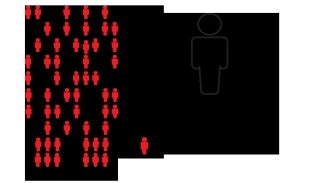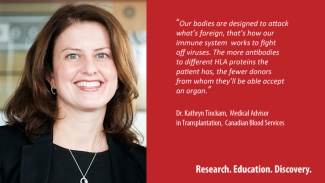Canadian ingenuity enhances tool used to estimate patient access to life-saving transplants
Wednesday, February 10, 2016 Jenny Ryan
A new innovation by a team of Canadian Blood Services researchers and the National HLA Advisory Committee has improved the situation for Canadian transplant patients.
Launched in April 2012, the Canadian cPRA Calculator was developed to support Canadian Blood Services’ transplant programs. It’s a web-based application used by the entire Canadian transplant community to estimate the percentage of Canadian organ donors with whom a transplant candidate may be incompatible.
How likely is a match? How long will it take? Patients in need of a transplant deserve the most accurate answers to their many questions. Transplant specialists need to be honest with their patients about the risks involved, their prospects for finding a match, and about how long they might wait. One tool that is used to equip patients and their doctors with crucial information is a cPRA calculator.
The Canadian cPRA (calculated panel reactive antibody) calculator estimates the percentage of organ donors with whom a transplant candidate may be a match.

The cPRA (calculated panel reactive antibody) calculator was first developed by the Organ Procurement and Transplant Network (OPTN) – a united network for organ sharing in the US. An excellent tool, it takes the list of antibodies in a patient and runs an algorithm to estimate the number of potential donors in the population. Some organ transplant candidates, especially those who have already been exposed to “foreign” tissue (through previous transplant, pregnancy, or blood transfusion), will have an immune system already primed to reject organs from donors with certain antibodies present.
There is now a Canadian version of this tool. And, thanks to some hard work and ingenuity by Canadian Blood Services’ National HLA Advisory Committee, it is a much improved and more accurate tool for estimating the percentage of organ donors with whom a transplant candidate may be a match.
“Through testing we can detect the antibodies, which are proteins of the immune system, in the bloodstream. These antibodies are directed against proteins called HLA (Human Leokocyte Antigens). And the HLA proteins are the major proteins in the body that help distinguish what’s yourself versus what’s foreign,” explains Dr. Kathryn Tinckam, medical advisor in transplantation to Canadian Blood Services. She’s a transplant nephrologist at the University Health Network in Toronto, Canada, and Co-Director of the HLA Laboratory.
“Our bodies are designed to attack what’s foreign, that’s how our immune system works to fight off viruses. The more antibodies to different HLA proteins the patient has, the fewer donors from whom they’ll be able to accept an organ.”
Doctors do HLA testing while patients are waiting for transplants. Once they figure which antibodies, and how many the patient has, they can use the cPRA calculator to estimate what that means in terms of getting a transplant.
Developing the Canadian cPRA
The Canadian team went a step further than the US did with their cPRA. They gathered donor-typing information from all of the HLA laboratories in Canada going back to 2008. They derived their own version of the calculator that included all of the relevant groups of proteins, including the three additional unacceptable antigens (DQA, DPA, and DPB) that are not part of the OPTN’s cPRA calculator.
To test and demonstrate the effectiveness of their calculator, they conducted a study that included more than 700 individuals. They compared results of the Canadian cPRA calculations against the OPTN’s cPRA and got the same results, when they included the three additional groups of proteins, they found an increase of more than 10 per cent in almost 27 per cent of the people.
“That’s not insignificant!” says Dr. Tinckam. “We created this calculator that essentially gives us a much more accurate estimate of people’s immune reactivity to the population and their likelihood of being able to find a matched donor.”
It is an exciting and important step taken by Canadian Blood Services’ Organ and Tissue Donation and Transplantation group and the National HLA Advisory Committee. The calculator is now used by all Transplant Centres and organ donation organizations in Canada and is available for the world to use. It is a more robust, publically accessible resource that is facilitating better communication between transplant candidates and their doctors.
The Canadian cPRA calculator is hosted and maintained by Canadian Blood Services. The study was recently published in the American Journal of Transplantation.

Dr. Kathryn Tinckam is a transplant nephrologist at the University Health Network in Toronto, Canada, and Co-Director of the HLA Laboratory. She is also the Medical Advisor in Transplantation to Canadian Blood Services, responsible for interprovincial listing and allocation and the Canadian Transplant Registry. A graduate of the University of Manitoba, she completed her nephrology and transplant fellowships at UBC, and her Histocompatibility and Immunogenetics at Harvard University. Her research and clinical interests focus on the impact of pre and post transplant donor specific HLA antibodies in solid organ transplantation, and improving access to transplant for sensitized patients.
Research Publication: cPRA Increases With DQA, DPA, and DPB Unacceptable Antigens in the Canadian cPRA Calculator. Tinckam KJ, Liwski R, Pochinco D, Mousseau M, Grattan A, Nickerson P, Campbell P. Am J Transplant. 2015 Dec;15(12):3194-201. doi: 10.1111/ajt.13355. PMID: :26080906
Keywords: Tinckam, transplantation, organs and tissues, HLA, cPRA calculator, antibody, alloantigen, immunogenetics, panel reactive antibody
Canadian Blood Services – Driving world-class innovation
Canadian Blood Services promotes leading practices and is actively involved in raising awareness and education of organ and tissue donation and transplantation. We maintain patient registries and help save and improve lives though research and innovation and by working closely with the organ and tissue donation and transplantation community.
The opinions reflected in this post are those of the author(s) and do not necessarily reflect the opinions of Canadian Blood Services.
Original content on R.E.D. falls under a creative commons CC BY license. We invite you to take it and republish it (with attribution and a link back to the source).
Related blog posts
A research, education. and discovery blog Did you know that we do research? Quite a lot of it, in fact. Last year, our research teams, working in our labs across Canada, published 250+ scientific papers in peer-reviewed journals and presented 200+ posters or talks at major national and international...
